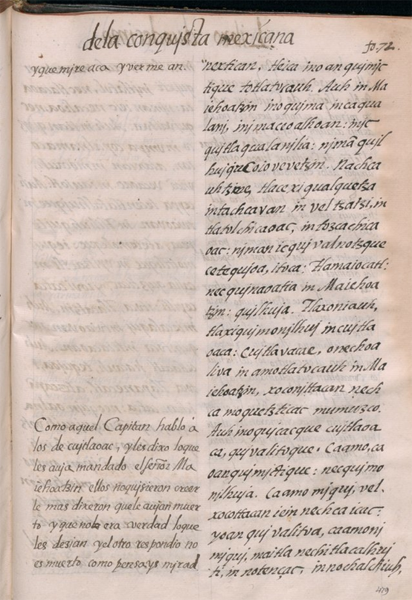Folio 72 recto
Translations and Transcriptions
Spanish Translation
[Transcription of the Spanish (left-hand column) by James Lockhart:] [f. 72r.] y que mire aca y verme an. Como aquel Capitan hablo a los de cuitlaoac, y les dixo lo que les auia mandado el señor Maiehoatzin ellos no quisieron creerle mas dixeron que le auian muerto y que no era verdad lo que les dezian y el otro respondio no es muerto como pensays mirad
English Translation
[Translation of the Nahuatl (right-hand column) by James Lockhart:] Show him to us. Why have you killed our ruler?” But when Mayehuatzin found out his subjects were angry, [since it made him angry], then he said to Coyohuehuetzin, “My elder brother, please get one of the war leaders who can shout, who has a strong voice.” Then they summoned a seasoned warrior named Tlamayocatl, and Mayehuatzin gave him instructions, saying to him, “Go over there and say to the people of Cuitlahuac, ‘Oh people of Cuitlahuac, your ruler Mayehuatzin has sent me. Look at him standing over there at the altar platform.’” When the people of Cuitlahuac heard it, they replied, “No, you have killed him.” Then he said to them, “He is not dead. Look well at the person standing there.” And [Mayehuatzin] replied, “I am not dead; may they not let my lip pendant, my greenstones, [Translation of the Spanish (left-hand column) by James Lockhart:] and that they should look this way and they will see me." When that captain spoke to the people from Cuitlahuac and told them what the lord Mayehuatzin had ordered them, they would not believe him, but said that they had killed him and that what they were telling them was not true. The other answered, "He is not dead as you think; look
Analytic Transcription
[Transcription of the Nahuatl (right-hand column) by James Lockhart:] [f. 72r.] -nextican, tleica in oanquimictique totlatocauh. Auh in Maiehoatzin in oquima in ca qualani, in imaceoalhoan: inic quitlaqualanilia:*nimā quilhui in Coiovevetzin. Nachcauhtzine, tla ce xiqualquetza in tachcavan in vel tzatzi, in tlatolchicaoac, in tozcachicaoac: niman ic quivalnotzque ce tequioa, itoca: Tlamaiocatl: nec quinaoatia in Maiehoatzin: quilhuia. Tla xoniauh, tla xiquimonilhui in cuitlaoaca: Cuitlavacae, onechoaliva in amotlatocauh in Maiehoatzin, xoconittacan nechca moquetzticac mumuzco. Auh in oquicacque cuitlaoaca, quivalitoque. Ca amo, ca oanquimictique: nec quimonilhuia. Ca amo miqui, vel, xocottacan ie in nechca icac: yoan quivalitoa, ca amo nimiqui, ma itla nechitlacalhuiti, in notençac, in nochalchiuh, ---------- *QUITLAQUALANILIA. Although the form appears to be based on qualani ‘to become angry’, and probably qualania ‘to make someone angry’, I have not attained a secure analysis.
Image

Spanish Translation
[Transcription of the Spanish (left-hand column) by James Lockhart:] [f. 72r.] y que mire aca y verme an. Como aquel Capitan hablo a los de cuitlaoac, y les dixo lo que les auia mandado el señor Maiehoatzin ellos no quisieron creerle mas dixeron que le auian muerto y que no era verdad lo que les dezian y el otro respondio no es muerto como pensays mirad
English Translation
[Translation of the Nahuatl (right-hand column) by James Lockhart:] Show him to us. Why have you killed our ruler?” But when Mayehuatzin found out his subjects were angry, [since it made him angry], then he said to Coyohuehuetzin, “My elder brother, please get one of the war leaders who can shout, who has a strong voice.” Then they summoned a seasoned warrior named Tlamayocatl, and Mayehuatzin gave him instructions, saying to him, “Go over there and say to the people of Cuitlahuac, ‘Oh people of Cuitlahuac, your ruler Mayehuatzin has sent me. Look at him standing over there at the altar platform.’” When the people of Cuitlahuac heard it, they replied, “No, you have killed him.” Then he said to them, “He is not dead. Look well at the person standing there.” And [Mayehuatzin] replied, “I am not dead; may they not let my lip pendant, my greenstones, [Translation of the Spanish (left-hand column) by James Lockhart:] and that they should look this way and they will see me." When that captain spoke to the people from Cuitlahuac and told them what the lord Mayehuatzin had ordered them, they would not believe him, but said that they had killed him and that what they were telling them was not true. The other answered, "He is not dead as you think; look
Analytic Transcription
[Transcription of the Nahuatl (right-hand column) by James Lockhart:] [f. 72r.] -nextican, tleica in oanquimictique totlatocauh. Auh in Maiehoatzin in oquima in ca qualani, in imaceoalhoan: inic quitlaqualanilia:*nimā quilhui in Coiovevetzin. Nachcauhtzine, tla ce xiqualquetza in tachcavan in vel tzatzi, in tlatolchicaoac, in tozcachicaoac: niman ic quivalnotzque ce tequioa, itoca: Tlamaiocatl: nec quinaoatia in Maiehoatzin: quilhuia. Tla xoniauh, tla xiquimonilhui in cuitlaoaca: Cuitlavacae, onechoaliva in amotlatocauh in Maiehoatzin, xoconittacan nechca moquetzticac mumuzco. Auh in oquicacque cuitlaoaca, quivalitoque. Ca amo, ca oanquimictique: nec quimonilhuia. Ca amo miqui, vel, xocottacan ie in nechca icac: yoan quivalitoa, ca amo nimiqui, ma itla nechitlacalhuiti, in notençac, in nochalchiuh, ---------- *QUITLAQUALANILIA. Although the form appears to be based on qualani ‘to become angry’, and probably qualania ‘to make someone angry’, I have not attained a secure analysis.
Image
